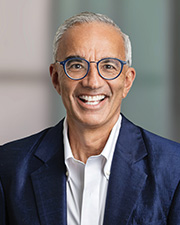Upcoming WTO conference addressing vital issues, can reverse existential crisis, international trade law expert says
LAWRENCE — The World Trade Organization’s 13th Ministerial Conference is set for Feb. 26-29 in Abu Dhabi, United Arab Emirates. The conference, which meets every two years, is the supreme governing body of the WTO.
MC 13 will bring trade ministers from the 164 WTO members to review the functioning of the global trading system and direct the future course of the WTO. Raj Bhala, a renowned international trade expert at the University of Kansas, is available to discuss the conference, its function, goals and ramifications of actions taken with the media.
 Bhala, Brenneisen Distinguished Professor at KU Law, can discuss the many topics slated for coverage at MC 13, including agricultural trade problems of market access, subsidies, cotton and public stockholding in food security; electronic commerce and digital trade controversies; prospects for dispute settlement reform; trade measures to combat climate change; schisms between rich and poor countries; and the accessions of two new members, Comoros and Timor-Leste.
Bhala, Brenneisen Distinguished Professor at KU Law, can discuss the many topics slated for coverage at MC 13, including agricultural trade problems of market access, subsidies, cotton and public stockholding in food security; electronic commerce and digital trade controversies; prospects for dispute settlement reform; trade measures to combat climate change; schisms between rich and poor countries; and the accessions of two new members, Comoros and Timor-Leste.
Bhala has followed every WTO Ministerial Conference since the first one in 1996 and has reviewed the draft negotiation texts for the 13th conference.
“The WTO faces a worsening existential crisis of relevance,” Bhala said. “What was intended to be the preeminent international organization for multilateral trade, and a pillar of global governance, is becoming a sideshow. What causes explain this decline, and what can be done at MC 13 to reverse it?”
About Raj Bhala
Bhala is the author of the acclaimed four-volume “International Trade Law: A Comprehensive Textbook” and 100 law review articles in the field, including a trilogy on the Doha Round of WTO multilateral trade negotiations, which in 2001 aimed in part to fight terrorism through freer, fairer trade. Bhala has two new books on the U.S.-China trade war and Trans-Pacific Partnership, plus a two-volume treatise on the General Agreement on Tariffs and Trade (GATT), and a textbook, “Understanding Islamic Law (Shari’a).”
Bhala practiced international banking law at the Federal Reserve of New York and represented the U.S. at the United Nations Commission on International Trade Law before entering academia. He has served as senior adviser to Dentons and consulted for many international organizations, governments, nongovernmental organizations and companies. He has worked in 25 countries including the UAE, Oman, Qatar, Saudi Arabia, Turkey, Argentina, Mexico, across the European Union, Japan, Korea, Bangladesh and Pakistan, and throughout India.